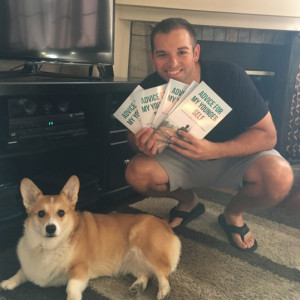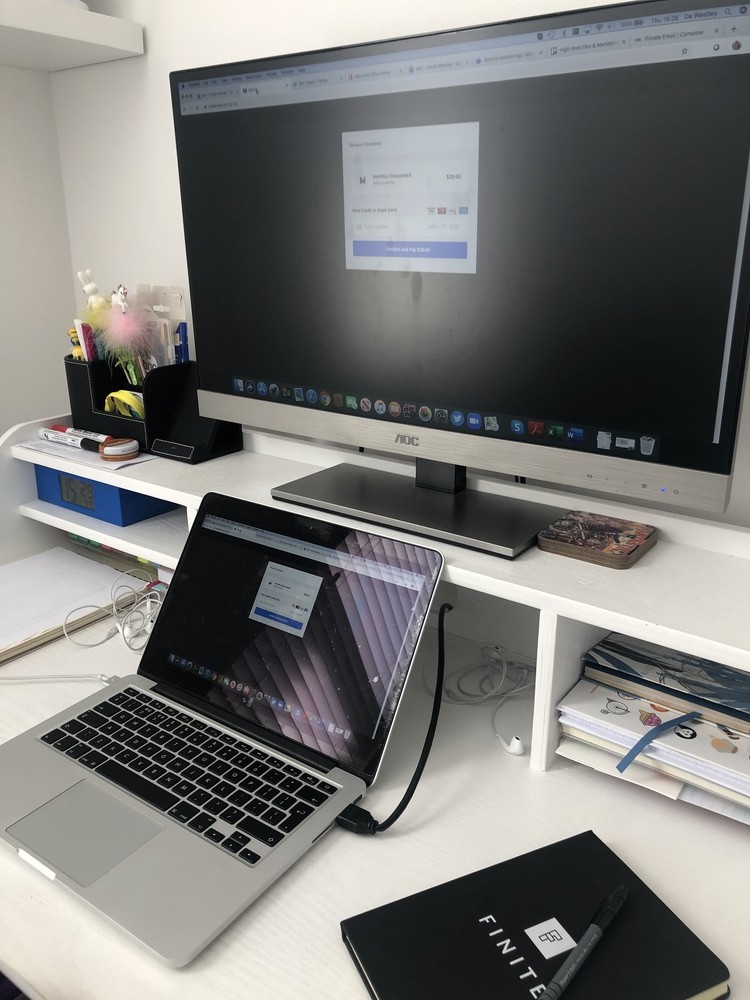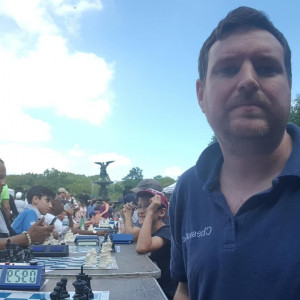Do you have a dedicated space to work?
Interview with Taylor, a marketing director and intentional digital nomad
I do. I have a hot desk at the WeWork in downtown Durham. I also have a desk at home, but I don't typically work from home unless I'm sick or it's pouring rain, and I don't feel like biking.
I find it isolating and more difficult to turn my brain off at the end of the day if I work from home too often.
I like coming home to a place of leisure. It's harder to do that when your primary workspace is visible from your couch.
Taylor shares how co-working spaces, digital nomadism, and work flexibility gave her the work environment she always wanted.
Read full interview from Interview with Taylor, a marketing director and intentional digital nomad.
Interview with Kay, an independent software consultant who found freedom in remote work
I don't have a dedicated space to work.
I work from where I am, sometimes at home, sometimes at one of my partners flats, sometimes in a coffeeshop or library.
Mostly I work with a MacBook Pro, which can do everything I need for work. I also carry around a few iOS and Android devices for testing purposes.
Learn how Kay made the jump from full-time employee to full-time remote consultant
Read full interview from Interview with Kay, an independent software consultant who found freedom in remote work.
Interview with Michael about being an entrepreneur and freelancer
For physical space I primarily work in my office as it's easier with both monitors and my desk.
When I'm writing I play specific music that helps me concentrate, have my phone silenced, and try to not get up until the work is complete. I'll drink plenty of water and 2 cups of coffee each morning. The music tends to be super loud and enjoy getting in my own space with no interruptions.
I try to break at the top of each hour, stand up, take some deep breaths, and do a few stretches.
Once my work is complete I leave the office and don't work in the living room anymore. I like to have separate spaces in my house associated with separate tasks. Otherwise I had no clear break of work and life.
Michael is an online entrepreneur, author, and freelance writer who specializes in self-improvement and personal finance.
Read full interview from Interview with Michael about being an entrepreneur and freelancer.
Interview with Pamela, a travel writer adjusting to freelancing
Yes, I have a very colorful, inspirational space, complete with a computer, printer, and vision boards.
More often than not, I work on my sofa upstairs and listen to music. I think this is a direct act of rebellion in reaction to sitting in a cube for so long, so I’m giving myself the freedom to enjoy it.
Pamela is new to the world of freelancing. In this interview, she shares the ups and downs of adjusting to the gig economy.
Read full interview from Interview with Pamela, a travel writer adjusting to freelancing.
Interview with Chloe, a customer support freelancer and multi-project expert
I have a relatively small space, but I do designate a corner of it to strictly work. My environment is quiet, well lit and uncluttered.
It consists of a desk, computer, pad of paper, and a few pens and pencils (I like to color code my notes).
I feel that if you set the energy in your space, it is easier to get into that mindset.
So, I keep recreational projects and distractions away from that corner so when I sit down; I go into “work mode.”
Chloe uses the flexibility of freelancing to her advantage—see how she successfully manages multiple projects at one time.
Read full interview from Interview with Chloe, a customer support freelancer and multi-project expert.
Interview with Andrew, a freelance writer who works remotely
I would say the only dedicated work space I need is a laptop to get the words written out.
But joking aside, I tend to stay at home when I write, usually sitting at my desk in the living room.
In previous times I had my own office, but that expense seemed to be a little unnecessary for the benefit that it was providing. I avoid busy places, although in my town there is this beautiful little tea house that has the perfect rustic charm and a great staff that I enjoy visiting to write.
Otherwise, I just stick at home. It’s comfortable and I can control the AC which is another important factor for me.
Andrew became a full-time freelance writer after experimenting with freelance marketplaces. After the first month, he was already earning more than his full-time job.
Read full interview from Interview with Andrew, a freelance writer who works remotely.
Interview with Cecilia, a content writer managing her remote career in Dubai
My freelance license in the UAE includes an office space open 24/7, but I don't go there every day. It's well-equipped but often colder than I'd like.
Most days, I work from my dining table or a coffee shop closer to my apartment.
Cecilia got her start translating blog posts, and in 2018 she went fully remote. See her tips for managing an international remote work career.
Read full interview from Interview with Cecilia, a content writer managing her remote career in Dubai.
Interview with Emma, a freelance marketing consultant
I do, indeed. I’m lucky enough to have a dedicated office in the house where there’s lots of light and where I collect my novelty pens and notebooks!
My HUGE monitor is also a godsend. Honestly, I find I’m way more productive when I’m working off it – I suppose because it’s so big, I’m immersed in whatever task I’m doing.
Emma is thriving as a freelance marketing consultant—see her tips on managing client demands & making yourself marketable as a freelancer.
Read full interview from Interview with Emma, a freelance marketing consultant.
Interview with Leon, a journalist teaching the world to play chess
Of course, with a toddler running around when he's not in the nursery, I need it. I have a home office set up which is also my chess room. It has all my chess books and magazines which I use for reference, a second screen so I can watch videos we produce while doing other stuff, and most importantly, a door to keep out the "little chaos-causer."
However, when I am out and about, I have used cafes, pubs, my local library, and trains when I'm going on a long journey. I had a little reminder of what it's like to commute into central London recently when the World Chess Championship was held here.
I got a train and a tube to Holborn every day for a month to work in the press room the organisers set up there. It was great working with a group of journalists again as well as having people to chat with, but getting the journey was a nightmare! So much of my day was wasted standing on station platforms.
I consider myself very lucky working from home.
Leon James Watson is a former journalist who has found the intrinsic value of remote work while teaching the masses to play chess.
Read full interview from Interview with Leon, a journalist teaching the world to play chess.
Interview with Steven Wade, a software engineer working on a remote team
I have a home office that has a door. Originally it was just a loft at the top of the stairs, but when we had a kid I built a wall to give both sides of us some peace and quiet from each other.
My office is my office. My family is welcome to come hang out in there and say hi from time to time, but I'm the only one who does work in there on a regular basis. With that in mind, I have a "home office budget" where I can buy supplies that I need and decorate it how I want.
It's important to have a comfortable environment that you can be productive in.
If you're going to spend 8ish hours a day in it, you want it to be a place that you like the feel, the flow, and the aesthetics of it.
Learn more about how Steven works remotely, including his work routine, habits and how he found his remote job
Read full interview from Interview with Steven Wade, a software engineer working on a remote team.









